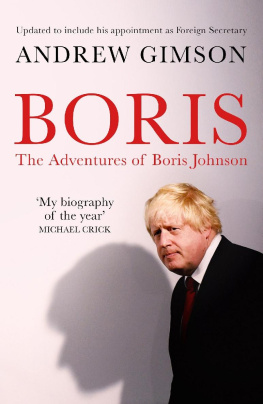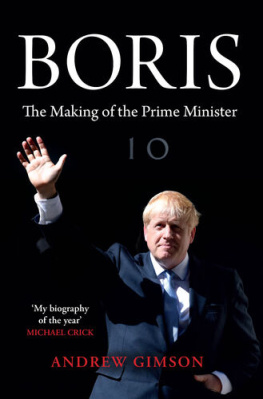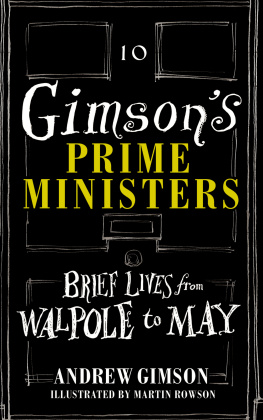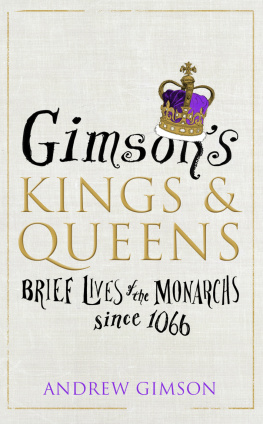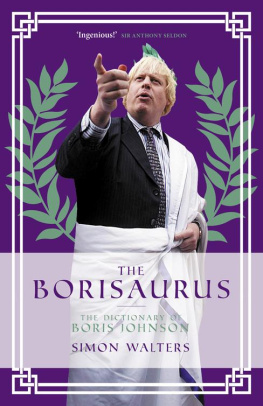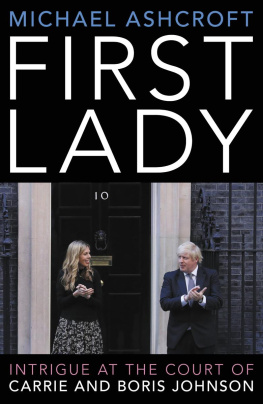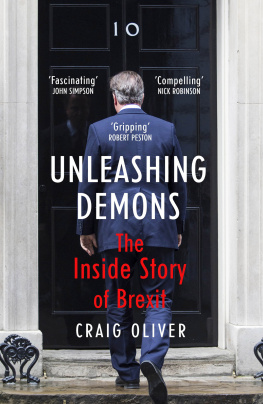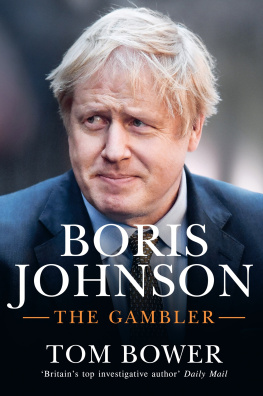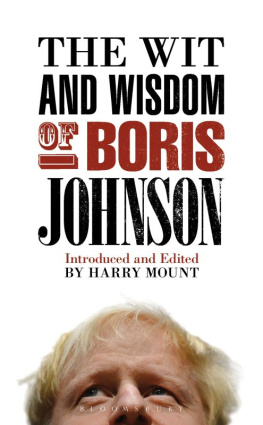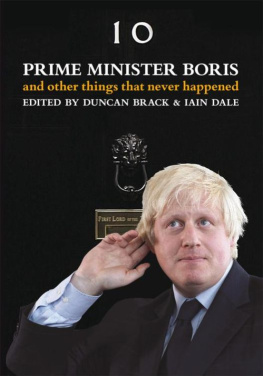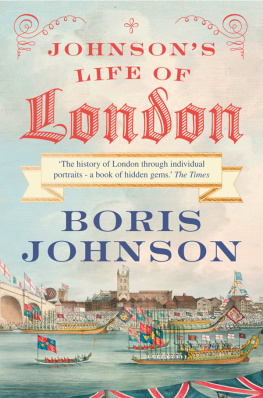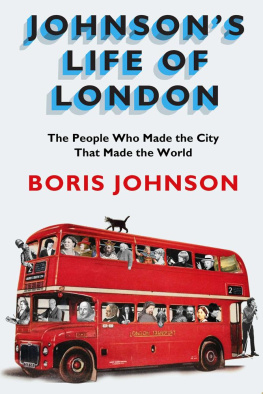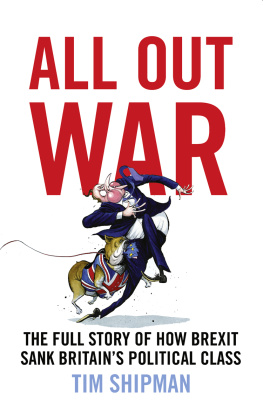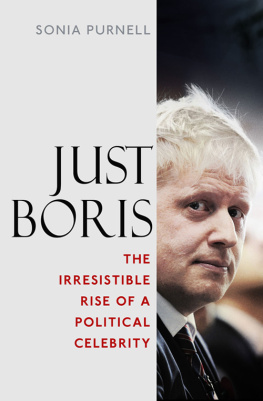Further praise for Boris :
A scintillating eulogy
Daily Telegraph
[A] beautifully written biography... In Gimson, [Boris] has found a generous biographer who has interviewed Johnsons friends and colleagues in journalism and Parliament. The author admits to being a friend but pulls no punches
Michael White, Guardian
The trick for politicians is to alchemise their abilities into charisma, as Andrew Gimson shows in his rollicking Boris: The Rise of Boris Johnson
Observer
A chatty, revelatory portrait of the blond crusader that pulls no punches while still being a fond tribute to a colleague
Scotsman
Richly entertaining
John Rentoul, Independent
Bozzer is one of those fascinating people thrown up by politics from time to time, while Boris the book is a jolly good show of high farce and low cunning
Paul Routledge, Tribune
Brilliant
Simon Carr, Independent
Boris , Andrew Gimsons stylish biography of the nations buffoon, simply shimmers with good will to all men. The result is an effervescent delight
Zenga Longmore, Spectator

Preface
In the summer of 2016, the most passionate, unpredictable and momentous political drama for many years unfolded in the United Kingdom. Boris Johnson played a starring role in all three acts, and was at once identified by some as the villain of the piece, while others hailed him as the hero.
In Act One, Boris led the Leave campaign to victory in the EU referendum, held on Thursday 23 June, by 17,410,742 votes to 16,141,241: a triumph which astonished and dismayed the establishment. Here was a rebellion by the people, or 52 per cent of them, against the experts, who had warned in the most emphatic terms that leaving the EU would be disastrous. The losing side, which included most of the intelligentsia, accused Boris not just of populism, but of opportunism: telling lies, stirring up racism and wrecking the economy in order to seize power for himself. For the first time in his life, Boris was not just scorned by his enemies, but hated.
At the start of Act Two, David Cameron resigned as Prime Minister, and Boris became the frontrunner to succeed him. But the Tory leadership race unleashed dark passions and unspeakable vanities. Civilised individuals revealed their unexpected capacity for treachery. Within six days, Boris was destroyed by the very people with whom he had just spent six months in close alliance. He saved the day only to the extent that he contrived, in one of the great pieces of political theatre of modern times, to announce to his astounded followers his own downfall.
People groped for Shakespearean analogies to describe this assassination. Boris himself referred to Brutus, who killed Julius Caesar. Others nicknamed his chief assailants wife Lady Macbeth. I was reminded of a line spoken by Hamlet about his fathers murderer: That one may smile, and smile, and be a villain. But there is no Shakespeare play which quite prefigures the plot of this Tory drama.
In Act Three, although it looked as if Boris had been buried, it turned out he was not dead, but sleeping. From the first weekend after the referendum, he had maintained quiet but friendly contact with Theresa May, the inscrutable woman, eight years older than himself, who on 13 July became Prime Minister and installed Boris as Foreign Secretary! People were so astonished they compared this to the raising of Lazarus, but that occurred after only four days, while Boris had lain for 13 days in the political tomb. Once again, the analogy did not quite fit, especially as Boris himself is a thorough-going pagan.
I wanted to set down my account of these convulsions as soon as I could, while the excitement of them was still fresh in my mind, and working against the clock to get the story finished. Other historians, including the admirable Tim Shipman of the Sunday Times , will offer more detailed accounts of what has occurred. But here, I hope, is a sense of the sheer unexpectedness of what happened, by one who lived through those almost sleepless days and nights.
It is followed by the account of Boriss early life on which I began work as long ago as 2004, and which I have been updating ever since. In this edition, two short new chapters at the end of the book touch on his performance at the 2012 London Olympics, when he first sprang to worldwide attention, and on his return in 2015 to the House of Commons, the narrow chamber in which he has never yet shone. Without some knowledge of his background, his style of politics, including his compulsion to combine seriousness with frivolity, becomes incomprehensible. Can such a bizarre character ever become Prime Minister? The question has still not been fully answered.
A difficulty arose over the books original subtitle, The Rise of Boris Johnson . Once he was knocked out of the leadership race, we changed this to The Rise and Fall of Boris Johnson . His elevation to the foreign secretaryship led my older daughter, Eliza, to propose that this in turn should be modified to The Rise and Fall of Boris Johnson . On the day after his promotion, the BBC published a profile under the title Boris Johnson: His rise, fall, rise, fall and rise , which shows what a zigzag path he has taken. But we have settled for The Adventures of Boris Johnson , as being less likely to become almost immediately out of date.
Andrew Gimson, Cagnes-sur-Mer, August 2016
Act One: Triumph
Before the EU referendum campaign began, Boris admitted he was veering all over the place like a supermarket trolley on the subject. But at teatime on Sunday 21 February 2016, he emerged from his familys handsome, end-of-terrace Georgian house in Islington to announce to the milling crowd of journalists and photographers which side he was going to back. The media were out in such force not just because Boris can be relied on to provide good copy, but because on his decision the whole story could turn. In a close-run fight, his powers as a campaigner might well make the difference between victory and defeat.
Two days earlier, David Cameron had returned from Brussels bearing the meagre fruits of his renegotiation of the terms of British membership, on the basis of which he would be urging people to vote to stay in the EU. Five Cabinet ministers, of whom the most eloquent and influential was Michael Gove, the Justice Secretary, had already announced they would be campaigning on the opposite side to the PM. Now the nation waited to see which way Boris would jump.
All who saw or spoke to him during that weekend agree he agonised over the decision. He went down to the family farmhouse near Thame, in Oxfordshire, to think things over. Ben Wallace, his leading supporter in Parliament, warned that siding with Leave would mean losing thirty votes in any future leadership campaign. The decision had to be made by Sunday evening, when Boris must file his column for Mondays Daily Telegraph . He composed two columns, one for and one against. According to someone who read both, the case for staying in the EU was stronger than that for leaving.
Some have pilloried Boris for his indecision, which they take as proof of his disgraceful insincerity. But this variable state of mind was shared by millions of voters, and by many politicians too. As no less a figure than Hugo Young, writing in This Blessed Plot: Britain and Europe from Churchill to Blair , has pointed out:
On no question of this period did more people in British public life change their minds than on Europe. There were conversions from one side to the other, and sometimes back again, each position often being held with a passion summoned from the realm of faith more than reason, where there are secret uncertainties that only the loudest voice can mask. Many, who first opposed British entry, later decided they had been wrong. Many others, who helped take Britain in, became virulent critics of their own handiwork.
Next page
